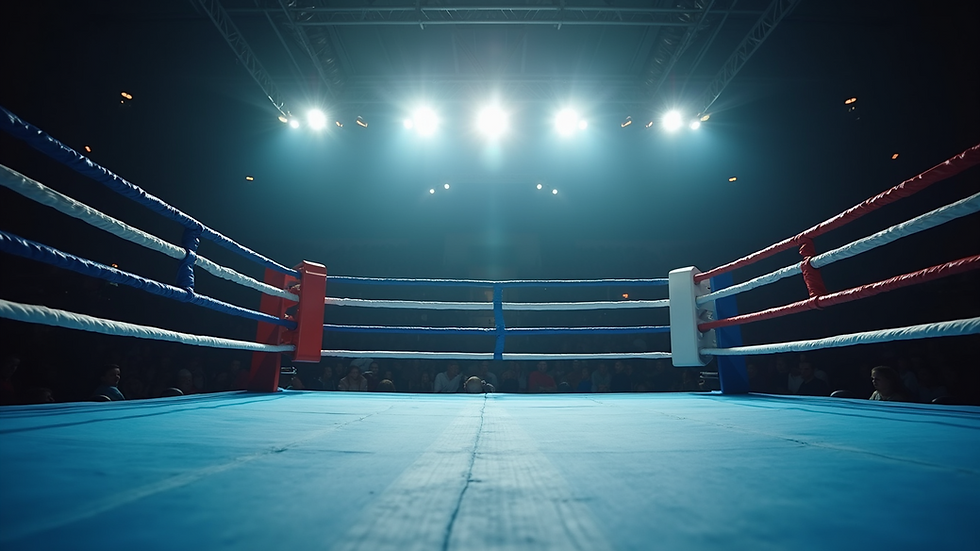Inside the Ring: How Mental Toughness Wins Fights
- Dr Paul McCarthy

- Jul 29, 2025
- 4 min read
In the thrilling world of boxing, the journey to victory is as much about mental strength as it is about physical conditioning. While physical attributes like strength and speed are undeniably important, the mental aspects often tip the scale between success and failure. This post will break down how mental toughness empowers fighters, focusing on the development of a winning mindset, strategic psychological preparation, and the importance of emotional control.
The Importance of Mental Toughness in Boxing
Mental toughness in boxing transcends having physical fitness. It involves emotional stability, resilience, and maintaining focus under pressure. Boxers who showcase mental strength often outperform their competitors, bouncing back from setbacks and keeping their fighting spirit alive.
Consider the example of heavyweight champion Anthony Joshua. After his unexpected loss to Andy Ruiz in 2019, Joshua showcased remarkable mental resilience. He didn't just return to the ring but transformed his mindset, leading to a successful rematch victory with a unanimous decision. Studies indicate that 79% of elite athletes believe mental toughness positively influences performance, underlining its crucial role.
Additionally, fighters face internal challenges such as self-doubt and anxiety. These mental battles can be as daunting as physical opponents, making it vital to cultivate mental fortitude.
Building a Winning Mindset
A winning mindset is essential in both training and competition. Fighters must believe in their capabilities, regardless of their past or the uncertainties of the future. This belief is not merely an inborn trait; it is cultivated through consistent practice.
Many boxers implement visualization techniques, imagining themselves triumphing in the ring. Research shows that such mental imagery can lead to improved performance, as seen in a study where participants who visualized success had a 25% increase in actual performance outcomes compared to those who did not.
Positive self-talk also plays a significant part in developing confidence. By replacing negative thoughts with affirmations, boxers enhance their self-belief, a critical factor when facing adversity.
Psychological Preparation for Boxing
Psychological preparation is often overlooked yet vital for success. It involves crafting a mental game plan before entering the ring. Boxers analyze opponents' strengths and weaknesses and prepare for various fight scenarios.
For instance, the renowned boxer Canelo Alvarez strategically studies his opponents, allowing him to exploit their weaknesses effectively. Pre-fight mental preparation includes practices like meditation and mindfulness, which have been shown to reduce anxiety levels by up to 40%.
Challenging training environments also foster resilience. Boxers can build mental toughness by simulating pressured situations, enabling them to use discomfort as a growth tool.
The Role of Emotional Control
Emotional control is paramount in boxing. A fighter overwhelmed by anger or frustration may make impulsive decisions. In contrast, a calm boxer can execute their strategy effectively.
Methods like deep breathing and visualization can help fighters regulate their emotions. For example, during intense bouts, top athletes often use controlled breathing techniques, allowing them to refocus, especially when the stakes are high.
Notably, fighters like Floyd Mayweather Jr. epitomize emotional control. He remains calm under pressure, allowing for better decision-making and ultimately fueling his undefeated record.

Mental Focus in the Ring
Maintaining mental focus during a match is crucial for success. The ability to ignore distractions and observe an opponent's moves can be the key to winning.
Boxers often use mental cues or rituals to stay focused. A simple phrase or routine performed before stepping into the ring can ground their minds. For example, many elite boxers incorporate similar warm-up routines, which can help center their focus prior to fights.
Monitoring their breathing is another effective strategy. Taking a deep breath at the right moment can refocus a fighter when adrenaline runs high, allowing for better performance.
Handling Pressure in Boxing
Every boxer faces pressure from numerous sources, including fans, coaches, and personal expectations. Effectively managing this pressure is a crucial skill that can be nurtured through practice.
Establishing a pre-fight routine can help manage anxiety. This might include specific warm-ups, mental rehearsals, and calming techniques aimed at creating a sense of control. Consistency in these rituals can make it easier to handle nerves when the bell rings.
Additionally, mentorship from seasoned fighters offers invaluable insights into coping with pressure. The wisdom gained from their experiences can clarify the mental hurdles new fighters face, fostering confidence in their own skills.
Cultivating the Mental Edge in Boxing
Cultivating a mental edge is crucial for any boxer. This edge is not just physical; it's about being prepared mentally for every challenge that comes in the ring.
Just as boxers dedicate hours to perfecting their punches, they should invest time in strengthening their mental game. Engaging with sports psychology can offer key insights into enhancing focus and emotional control.
Setting both short-term and long-term goals helps provide direction. Achieving these benchmarks nurtures a sense of accomplishment, further reinforcing mental strength and resilience.
The Takeaway
Boxing is a battleground that tests not only physical skills but also mental toughness. The best fighters possess not only the physical attributes but also the mental resilience to thrive under pressure.
Investing time in mental training pays off significantly. By focusing on building a winning mindset, refining emotional control, and developing focus strategies, fighters can gain a substantial advantage in the ring.
Remember, the mind is just as vital as muscle when pursuing victory. Train your mind effectively, and success will surely follow.









